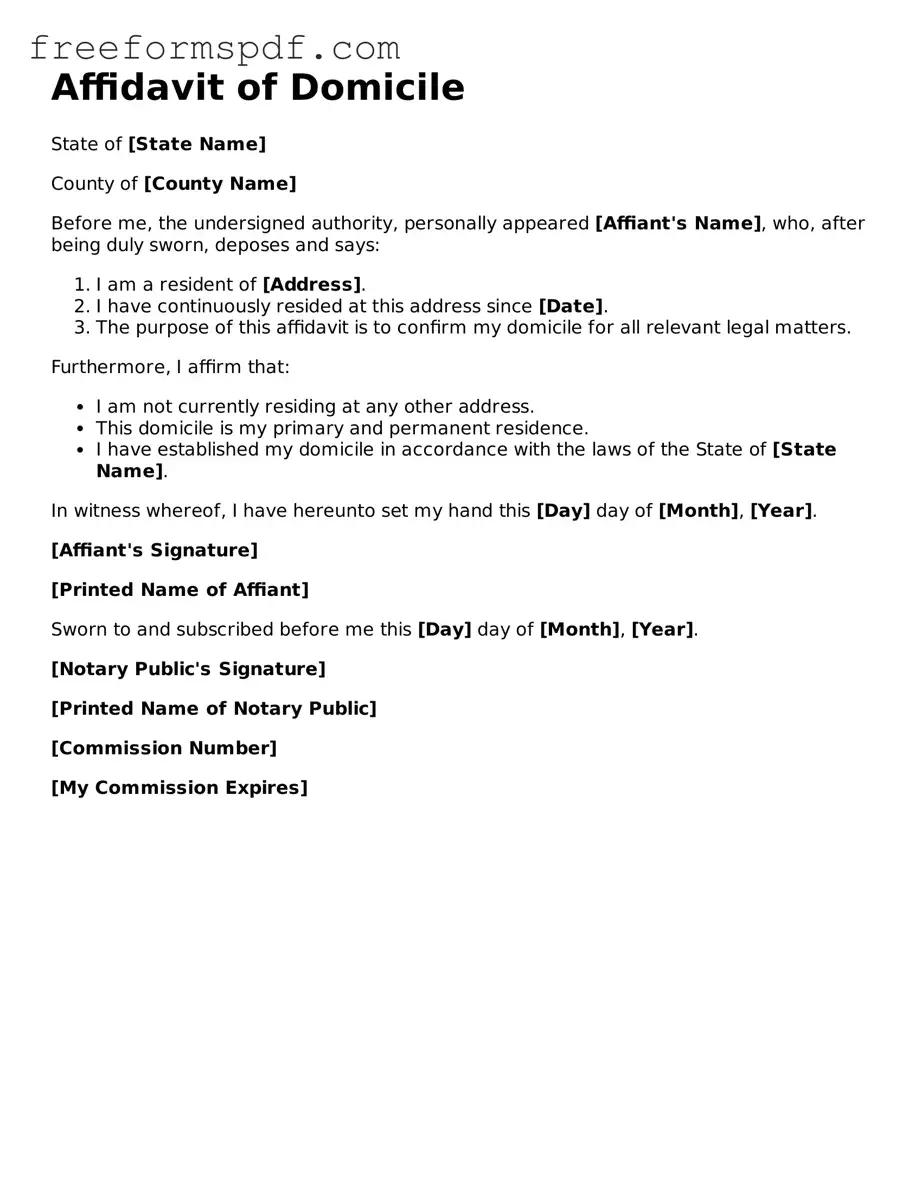Affidavit of Domicile Document
Common mistakes
-
Inaccurate Personal Information: Many individuals mistakenly provide incorrect names, addresses, or dates of birth. Ensure that all personal details match the official documents.
-
Omitting Required Signatures: A common oversight is failing to sign the affidavit. Remember, the document must be signed in front of a notary public to be valid.
-
Not Including Supporting Documents: Some people forget to attach necessary documentation, such as identification or proof of residency. These documents help validate the claims made in the affidavit.
-
Using Incorrect Notary Information: It is crucial to ensure that the notary's information is filled out correctly. Errors here can lead to the affidavit being rejected.
-
Failing to Review the Completed Form: Rushing through the form can lead to overlooked mistakes. Always take the time to review the affidavit thoroughly before submission.
Learn More on This Form
-
What is an Affidavit of Domicile?
An Affidavit of Domicile is a legal document that confirms an individual's permanent residence. It is often used in estate matters, particularly when transferring assets after someone's death. This document helps establish where the deceased lived at the time of their passing.
-
Who needs to file an Affidavit of Domicile?
Typically, the executor or administrator of an estate files the Affidavit of Domicile. This person is responsible for managing the deceased's affairs. However, any interested party may also file it if they have a vested interest in the estate.
-
What information is included in the Affidavit of Domicile?
The Affidavit of Domicile generally includes:
- The full name of the deceased
- The date of death
- The address of the deceased at the time of death
- The relationship of the affiant (the person signing the affidavit) to the deceased
- A statement affirming the accuracy of the information provided
-
Is the Affidavit of Domicile a notarized document?
Yes, the Affidavit of Domicile must be notarized. This means that a notary public needs to witness the signing of the document. Notarization adds a layer of authenticity and helps prevent fraud.
-
Where should the Affidavit of Domicile be filed?
The Affidavit of Domicile is typically filed with the probate court in the county where the deceased lived. Some financial institutions may also require a copy to process the transfer of assets.
-
Can the Affidavit of Domicile be contested?
Yes, the information in the Affidavit of Domicile can be contested. If someone believes the affidavit contains false information or that the deceased did not reside at the stated address, they may challenge it in court. This could lead to further legal proceedings.
-
How long does it take to process an Affidavit of Domicile?
The processing time for an Affidavit of Domicile can vary. Once filed, the court may take several weeks to review and accept the affidavit. Factors such as the court's workload and whether any challenges arise can affect this timeline.
Misconceptions
Many people have misunderstandings about the Affidavit of Domicile form. This document is important for establishing where a person lives, especially for legal and tax purposes. Here are six common misconceptions:
- It is only for estate purposes. While it is often used in the context of settling an estate, the Affidavit of Domicile can also be important for tax matters and other legal situations.
- Anyone can fill it out. Only the individual whose domicile is being declared or an authorized representative should complete the form. Incorrect information can lead to legal issues.
- It is a permanent document. An Affidavit of Domicile is not permanent. If a person moves, they may need to file a new affidavit to reflect their current residence.
- It does not require notarization. This form typically needs to be notarized to be valid. A notary public will verify the identity of the person signing the document.
- It can be used interchangeably with other forms. The Affidavit of Domicile is specific to establishing residency. Other forms may serve different purposes and should not be confused with it.
- It is only necessary for tax residents. Even if a person is not a tax resident, an Affidavit of Domicile may still be needed for various legal reasons, such as voting or property ownership.
Understanding these misconceptions can help ensure that the Affidavit of Domicile is used correctly and effectively.
Other Types of Affidavit of Domicile Forms:
What Is Joint Tenancy in California - Many organizations require an Affidavit of Death to honor benefits for survivors.
What Is a Testamentary Affidavit - The Self-Proving Affidavit enhances the likelihood of a swift probate procedure.
In the realm of property transfer, the Texas Affidavit of Gift form serves as a crucial instrument to formalize the donation of assets, thus safeguarding the interests of both the donor and the recipient. By carefully filling out this document, individuals can ensure clarity in the transfer process and prevent misunderstandings down the line. For those looking for a reliable source to obtain this form, you can visit documentonline.org/blank-texas-affidavit-of-gift/ to access the necessary template.
Single Status Certificate Usa - By completing the Single Status Affidavit, you assert your eligibility to enter into marriage.
